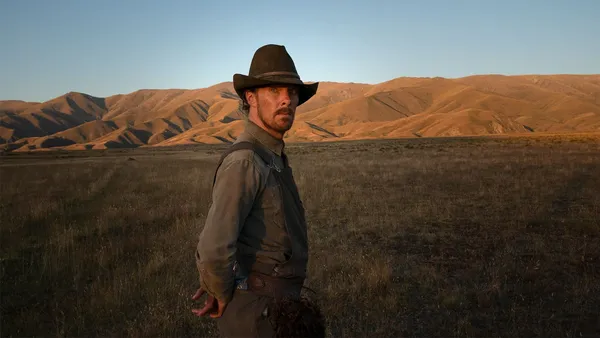Eye For Film >> Movies >> The Power Of The Dog (2021) Film Review
The Power Of The Dog
Reviewed by: Amber Wilkinson

There are shadows in Jane Campion’s latest, broody drama. Physical ones, like the one that will prove a talking point as it falls on a mountain and more metaphorical ones, like that cast by the brief piece of voice-over at the start, one that also asks a question that is central to the whole narrative – “What kind of man would I be, if…”
In truth, in the landscape of 1925 rural Montana, only one type of man is truly allowed. The type who saddles up and rides out with his cattle and who may or may not take a bath at the end of the trail. This last point puts the leather-soaked Phil (Benedict Cumberbatch) at odds with his quiet but dapper brother George (Jesse Plemons). The two seem at quiet but noticeable disagreement over everything, Phil’s mind firmly rooted in the landscape of tradition and his obsession with their “Uncle Bronco” who taught them to be cowboys, while George represents the more modern wind that is blowing over the prairie, bringing with it motor cars and tarmacadam – they are like jigsaw pieces that just won’t fit. Nobody fits, though, here, even when they are family, with the relationship between lodging house owner Rose (Kirsten Dunst) and her son Peter (Kodi Smit-McPhee) also strained. He has plans to study medicine, while helping serve the cowboys but his effete manner and lisp immediately attracts Phil’s attention and sees him branded “Miss Nancy”. We’ll come to realise that all these characters are desperately lonely in their own way, an emotion that seems, as it rubs up against jealousy and sadness, to conspire against connection.

This is, of course, just the beginning of a story – based on the novel by Thomas Savage that drew on his own life experience – and one that will mosey in unexpected directions as the psychodrama at its heart begins to truly take shape. But Campion treats the material with such well-mannered reverence that you begin to wish that not just the characters, but she too, would loosen up a bit. Her films like The Piano had a flowing quality brimful of emotion, while here the characters feel more jagged and sharp to the touch, as though they needed more smoothing off in order to feel completely real. The two who are best served are Phil and Peter, whose outward oppositional veneers cover other, unexpected emotions.
For all the handsome lensing from cinematographer Ari Wegner and western-inflected spiky scoring from Johnny Greenwood, things drift in terms of drama. Unfolding in episodes, it is no big surprise when George marries Rose and more foreseeable that the arrival, at the brothers’ ranch – crammed to the rafters with dead animals – leads to friction between Rose and Phil. As Phil brings quiet threat to his relationship with Rose, goading her when she tries to play piano and leaving doors open to bring a literal chill to the room, George fades off the scene for long periods – which not only deprives us of the fine acting of Plemons but also makes little sense in the context of the tale. Rose, unexpectedly, for Campion who is usually a master craftswoman when it comes to female characters, feels reduced to a single, if mournful, note.
Though Campion finds moments of homoerotic charge in unexpected places and all the actors bring their A game – especially Cumberbatch who gradually unfolds his extensive range so that although moving with stealth it ultimately hits you like a bull at full gallop – there’s quite a lot of what feels like padding before she allows tension to bloom in a final act. It is here that the film really gets back in the saddle, and gallops to its thrilling and unexpected climax.
Reviewed on: 01 Dec 2021


















